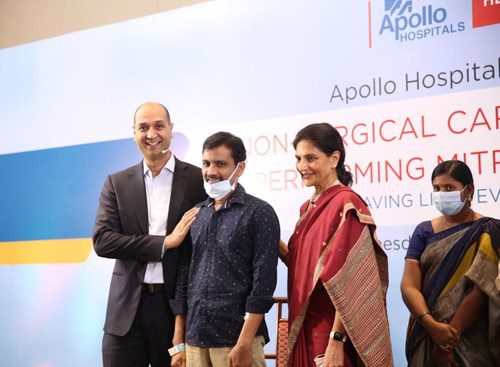Apollo Hospitals, Asia’s foremost and most trusted healthcare group, today announced a successful MitraClip implant on a 41-year-old male farmer who had waited for over three months in different hospitals for a heart transplant. The patient was back on his feet within a few days after the procedure, and might not even need a heart transplant.
Ms. Preetha Reddy, Executive Vice Chairperson, Apollo Hospitals Group said, “As one of the few hospitals in India accredited to perform the MitraClip procedure, being able to save the life of a patient waiting for a heart transplant gives us the ability to offer hope to many others. Research has shown that using MitraClip as a bridge to heart transplantation is safe and may lead to functional improvements that permit patients to be removed from the transplant list. We are proud to have demonstrated this at Apollo Hospitals through the case of a 41-year-old male patient who was waiting for a heart transplant for over three months. The success of this case has renewed our commitment to taking this cutting edge and revolutionary medical innovation to the people who need it the most.”
Dr. Sai Satish, Senior Interventional Cardiologist, Apollo Hospitals said, “The MitraClip is a globally accepted procedure for patients with heart failure. For three years now we have been performing this procedure on patients and we have seen incredible results in the quality of life they are able to return to. Our experience in this domain has enabled us to achieve many milestones including back-to-back MitraClip implants in four very sick patients in just one day. Today, we are at pole position; 70% of all MitraClips in India to date have been performed at Apollo Hospitals and we are only looking at bigger milestones in the journey ahead.”
India’s first two scientific papers on MitraClip have both been published from Apollo Hopsitals. Dr. Sai Satish is involved in the authorship of the APAC guidelines for MitraClip implants. Asia’s first MitraClip training programme that included theory and four cases over two days was conducted at Apollo Hospitals, cementing its position as a Centre of Excellence in Interventional Cardiology.
